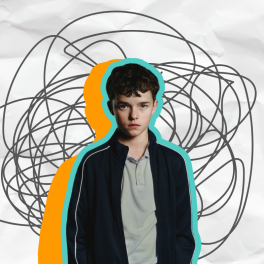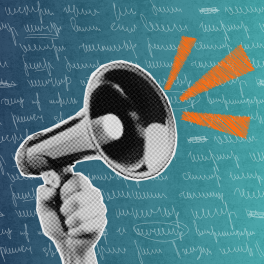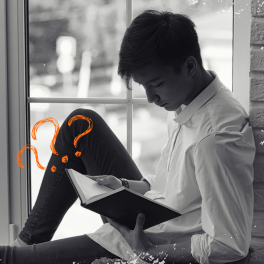
Caleb’s writings are often woven with themes of youth, reflective of his formative years, modern life, and the bittersweet feeling of growing up in a small town. His spoken performances have captivated audiences from from his home town Barrow, to Leeds and Manchester, leaving them laughing, thinking and in awe of the depth of his story telling. His work can be seen in print within various zines and his voice heard on BBC Radio Cumbria. As well as his creative work, Caleb facilitates various workshops for the autistic community, and is an advocate for change and understanding for all disabled communities.
Interview conducted by VoiceBox's Lauren Louisha

It's such a pleasure to have you with us today Caleb, I've been a huge fan of your work since the Survivor’s Zines first edition! Can you tell our audience a bit about your background in poetry and how you started writing?
I did creative writing in college, and around the same time, button poetry was becoming popular online. So initially, I was inspired by those poets. Your Neil Hillborns, your Olivia Gatwoods, Sabrina Benheim, Rudy Francisco. I wasn't a big reader growing up at all. I'm bad with grammar, my spelling is all right. It's not great. What drew me to poetry is that there aren't any rules to it. You can sort of just make it however you want, which really appeals to me. I started performing poetry when I was at university in Manchester and discovered the big scene they have there. Will and Micky from Switchblade Society were some of the first poets I met and have been really supportive throughout my journey. I spent many nights in the basement of The Peer Hat performing at their nights!
As well as performing your poetry at various venues and cities, you also host a spoken word night in your hometown, to support MIND. How did that come about?
I moved back to Barrow a few years ago. I think it's often a bit of a misconception that ‘oh there's nothing happening’ here. There are lots of gig venues, arts and culture places that are putting on concerts and film screenings. But in terms of poetry, there wasn't really anything going on, but a brilliant poet, Sally Anne, started a poetry group just for people to meet up, chat and share what they've been working on.
A while ago, my mate Georgia and I put on a fundraiser for Palestine, and she asked if I wanted to put on a poetry night in aid of MIND, and we did the first one in October last year, for World Mental Health Day. Originally, it was just going to be a bit of a one-off thing, really but we had a really good turnout. We had loads of people performing, from Sally’s group, also people that had never, people that were really new to it or people that had been doing it for ages. I remember chatting to one gentleman there who must have been in his 50s or 60s. He said, "Oh, I've never done anything like this. I've never had the opportunity to." And I think that's why I was really eager to carry it on. You know it's been really nice. MIND had some really good feedback, too. It's every other month. Come on down!

In our initial chat, you described writing poetry as an ‘escapism from the self’, which really stood out to me. Could you delve more into what you meant by that?
I've always found it really therapeutic to write, purely to get the thoughts out of my head and somewhere else. For me, there's lots of stuff that I write that I probably won't share or a lot of stuff that I probably won't perform anytime soon because it's not for that. I think the world is very sort of productivity-based, there's a big emphasis on being creative, writing, posting about it constantly, feeding the algorithms. I think sometimes people get trapped in that thing of ‘I need this to be publishable, marketable, it needs to be put out there, and it needs to be written a certain way or it needs to be a certain style to appeal to publishers’. They get lost in that, rather than just enjoying the idea of creating something. That's where the escapism thing comes from for me; it's that thing of taking things out of my head and onto a page. By writing and throwing that thought away, and by way of that, I’m improving my wellness, I’ll end up feeling a bit happier, which allows me to grow better.

I’m sure you’ve written countless poems, each one meaningful in its own way. But is there a particular poem that, when you read it again, you find yourself thinking, ‘Wow, I really wrote that’? If so, can you tell us about it?
Wow, I mean, there's one that I performed at the Survivor Zine launch, and that poem is dealing with quite heavy subject matter, and when you're performing poetry, you feel very exposed. The more emotional stuff is really, I find that stuff more sort of not impressive, but like I'm more proud of it. I do really enjoy performing, the more comical ones purely because it's more casual, more relaxed. I like the fact that I can be very varied in what I'm writing about. I can write about very serious stuff, and it could be really heartfelt, or I can write very silly, ranty stuff, but I think I always like to have that underlying thing of a bit of slice of life in there somewhere.
Image credit: giugliotto
Do you have a writing process or routine that helps you get into a creative flow?
God, that's a really good question! I think for me, a lot of the time, the inspiration just strikes at different times. There's a writing group at the library that I go to every week, and even if I'm not feeling the most inspired, I’ll edit something I’m working on in the workshop instead. I'm still writing regularly for a couple hours every week, which is something that I think is difficult for people to do because they think I need to be in the mindset. I need to be sort of in that flow state when I'm writing, and it's all going well, and the words are just coming to me. But I think attending those groups and attending other workshops has been really helpful because it's forced me to get into a routine of writing.

Image credit: alexsnd.films

Do you have any plans to release a collection of your work?
Yes, but at the moment I'm putting a lot more time into just writing and developing my practice. I do want to look at doing zines, chatbooks and types of shorter form stuff. Right now I'm enjoying the workshops that I'm facilitating, hosting and performing, there's lots of stuff that I've got planned on the horizon. It's just a question of what happens when! I'd love to though, I've got notes upon notes on my phone of when I’d bring out a book, what I want it to be and how I want the launch night to be and the venues I want to approach and I've really I've properly planned it out like a bucket list. The plans are all there, but I'm sort of taking my time. It's like, but what do I actually put in it, you know? Yeah, I'm really indecisive as well as the other thing. One thing that really appeals to me about performing poetry rather than writing it and printing it is the temporary nature of it.
Image credit: jordspunkpoetry
As well as being a creative, you work with Autus Cumbria, a non-profit organisation. Can you tell us more about Autus Cumbria and the importance of the work they do?
Autus Cumbria is a not-for-profit that supports autistic children and young people, up to 25 years old, along with their parents and carers. We run various weekly groups, training for parents and carers so they can better understand not just autism generally, but specific subject areas that are maybe talked about a bit less in terms of autism. We always do employment support for people to help them get into work as well. I think a lot of it is about shining a light on successes, but also shining a light on subjects that maybe aren't talked about as often within autism.
We also host a brilliant night called Sensing Melodies that we've been doing for years, and it's all autistic performers, and it's great. It's been good to have musicians, bands, singers, dancers and sort of to give them an opportunity to perform as well. If you're giving people an opportunity, you're amplifying their voice. You're giving them an outlet that they might not have otherwise. That's a really wonderful fundamental thing for a lot of the stuff that we do.
Have there been any stand-out positive experiences you have had since working with Autus Cumbria?
Sense of Melodies has been such a positive experience, seeing people performing, in a crowd full of parents, carers, members of the public, former teachers or TAs and people that you know, becomes a bit of a community. That's been really nice, I think more generally, the conversations you're able to have with people too. For me, I've been able to connect with a lot more autistic people through working there. When I go to a group that we put on or an event, I'm meeting lots of other people who are autistic. Growing up, I didn't know many autistic people, now I do.
I'll chat to people that are the same age as me or even people that are older, who have only been recently diagnosed, and I'm able to give them advice because I've known since I was about three or four, I've always had that context. Then there are other people who can give me advice about work, relationships or whatever it might be. So I find the community that Autus has created and that I've been able to be part of has been a real highlight for me.
What does it mean for you to be an advocate?
I remember chatting to a colleague of mine and one of the things that he said was if you're part of any marginalised group, whether it's disability, race, sexuality or whatever it might be, you know that feeling of being othered. You know that feeling of being put in a separate box, the feeling of you're being treated as different to everyone else or less than everyone else. I feel like if I can amplify the voices of people around me or support people, whether it's a group that I belong to or a group that I don't belong to, I think that's really important because not everyone has the capacity or the circumstances or the confidence to be that voice for themselves. We all know what that feels like. So to be at odds with one another feels counterproductive because we're all going through the same stuff really. You know, the context is very different, the severity is very different, the impact is very different, but on a base level, we're being told, "Here's everyone else. Here's you." You know?

Image credit: alexthegeek101
What do you wish the neurotypical community better understood about the neurodivergent community?
Not one-size-fits-all. I always want people to know that no two people are the same. It’s important to just have those conversations with the people in your life who are autistic and listen to their recommendations. Listen to what their needs are, don't assume that because they're autistic, they won't like loud noise or they won't like crowded spaces.
A big misconception I always come across, people assume it's a learning difficulty or it's a mental illness. They tiptoe around the word disability. I would say it's a disability. I would say I'm disabled by it, more so by way of how people interact with it rather than it itself, but yeah, that's the big thing for me in terms of what I wish more neurotypicals knew.
Thank you so much for joining us today. It’s been amazing to hear more about your poetry and your advocacy work for children and young people. Before we wrap up, do you have any words of wisdom you'd like to share with our audience?
Don't be afraid of failing, you know? Be open to the idea of it, don't be afraid of getting stuff wrong or not doing something perfectly. Everything is a work in progress; we're all sort of making it up as we go along. I don't think any of us have got everything together all the time, that's just not how we work. Be accepting of the fact that things aren't always going to go well, to be accepting of that is really freeing, and I think alongside that, I think there's a lot of power in not caring.
Support Young Creators Like This One!
VoiceBox is a platform built to help young creators thrive. We believe that sharing thoughtful, high-quality content deserves pay even if your audience isn’t 100,000 strong.
But here's the thing: while you enjoy free content, our young contributors from all over the world are fairly compensated for their work. To keep this up, we need your help.
Will you join our community of supporters?
Your donation, no matter the size, makes a real difference. It allows us to:
- Compensate young creators for their work
- Maintain a safe, ad-free environment
- Continue providing high-quality, free content, including research reports and insights into youth issues
- Highlight youth voices and unique perspectives from cultures around the world
Your generosity fuels our mission! By supporting VoiceBox, you are directly supporting young people and showing that you value what they have to say.





